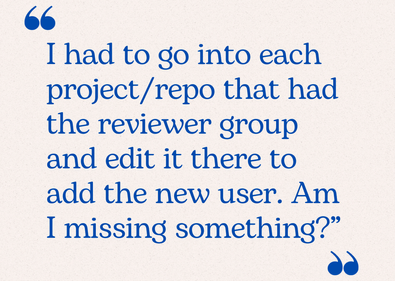Community resources
Community resources
Community resources
Solve Bitbucket Reviewer Groups with Workzone
Development teams, QA teams, and other Bitbucket teams often face challenges in managing their reviewer groups. These groups are essential for efficient code review processes, but they require manual creation and maintenance on a project or repository level. This can lead to duplication and busy work when people join or leave teams, or the organization entirely. In this blog post, we will explore the problem faced by these teams and discuss the potential benefits of using Active Directory-based reviewer groups such as that found in our Workzone for Bitbucket app.
The Problem with Manual Reviewer Group Management
-
Duplication of Effort: Maintaining reviewer groups manually requires team members to spend time and effort creating and updating these groups for each project or repository. This can lead to duplication of work, as similar groups may need to be created for different projects or repositories.
-
Inconsistency: Manual management of reviewer groups can also result in inconsistencies, as different team members may have different approaches to creating and updating these groups. This can lead to confusion and inefficiency in the code review process.
-
Busy Work: When team members join or leave a team, or the organization entirely, the manual management of reviewer groups can become a time-consuming task. Team members may need to be added or removed from multiple groups, which can be a source of frustration and a waste of valuable time.

The Potential Benefits of Active Directory-based Reviewer Groups
- Elimination of Duplication: Active Directory-based reviewer groups would allow teams to create and maintain groups at the organizational level. This means that teams can reuse existing groups for different projects or repositories, eliminating the need for duplication of effort.
-
Streamlined Onboarding and Offboarding: With Active Directory-based reviewer groups, the process of adding or removing team members from these groups can be automated. This would alleviate a lot of busy work when people join or leave a team or the organization, as the changes would be reflected in all the relevant projects or repositories.
-
Consistency in Group Management: By using Active Directory-based reviewer groups, teams can ensure that the management of these groups is consistent across the organization. This would lead to a more efficient and effective code review process, as team members would be familiar with the group structure and expectations.
-
Integration with Existing Systems: Active Directory-based reviewer groups can be integrated with other systems and tools used by the organization, such as project management software or communication platforms. This would further streamline the code review process and improve collaboration among team members.
-
Improved Team Velocity: Outdated reviewer groups can lead to a decrease in team velocity. When people move teams, they don't want to be inundated with pull request review requests for a project they no longer work on and miss out on reviews for the projects they are currently working on. Active Directory-based reviewer groups can help prevent this issue by automatically reflecting the new group structure for all pull requests.
The manual management of Bitbucket reviewer groups can be a source of frustration and inefficiency for development teams, QA teams, and other Bitbucket teams. By implementing Active Directory-based reviewer groups such as that found in Workzone for Bitbucket, teams can eliminate duplication, streamline onboarding and offboarding processes, ensure consistency in group management, integrate with existing systems, and improve team velocity. This would ultimately lead to a more efficient and effective code review process, benefiting both the teams and the organization as a whole.
If you’re ready to turn over a new leaf and put the frustration behind you, we welcome you to give Workzone for Bitbucket a try!
As always,
Happy coding, friends.
Sean Manwarring - Izymes
Was this helpful?
Thanks!
Sean Manwarring _Izymes_

About this author
Head of Marketing at Izymes
Izymes
Australia
2 accepted answers
Atlassian Community Events
- FAQ
- Community Guidelines
- About
- Privacy policy
- Notice at Collection
- Terms of use
- © 2024 Atlassian







0 comments